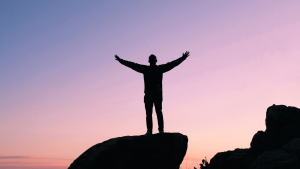I have had the privilege of working with a few people whom I would describe as societal leaders – they work for the betterment of the society and typically are found in the hardest of contexts, such as conflict or poverty. I have got to know them and understand what it is that makes them be who they are. I have set out four personal observations. These are not intended as a rigorous study – more as a catalyst for thought and debate.
Experiences outside the norms of normal life
Societal leaders have mostly had experiences that are outside of the norms of most people’s experience and this experience has generated a profound and sustained drive towards a calling that they cannot walk away from. They develop a purpose for their life that is way beyond themselves; for many, it becomes so important that they are often prepared to lose their own lives for the society that they serve.
In fact, many societal leaders are born into very healthy and supportive environments – and it is in stepping into the challenge that they then truly transform themselves. Societal leadership does not mean one has to be born into these challenging conditions; it requires caring, and then being courageous enough to make a change.

Values of love and fairness
Threatening or harsh conflict seems to send human beings in one of two ways – they can become more tribal, with a higher propensity to violence, or they can become even more values-driven, more empathetic, more capable of embracing the perspectives of others, and fuller of love for the wider world.Such leaders have an enormous capacity for forgiveness, and aren’t worried about trying to seek revenge. They work for a greater good – something that takes remarkable levels of discipline and resolve.
An extraordinary level of self-awareness
Lao Zhu said “Knowing others is wisdom, knowing yourself is enlightenment. Overcoming others is strength, overcoming yourself is true power.” The societal leaders I have worked with understand and embody the most progressive notions of leadership, even though they have had limited development in this field. They have all had significant periods of self-reflection on who they really are, what they stand for and how they can derail and enable themselves and their society.
A capacity for understanding complexity
In one of our peace building programmes, a quote from Rumi became profoundly insightful to the group: “Out beyond ideas of wrongdoing and rightdoing, there is a field. I’ll meet you there.
”These leaders are able to act from a place beyond disturbance, one-sidedness, polarisation and bias– they can see the wider picture. A Mindell called these societal leaders as elders, saying “world elders enable communication by encouraging others to go over their edges, to flow over boundaries that separate us.”
Summary
These observations are intended only as a catalyst for thought. Perhaps it means for us that if we want to find our most extraordinary version of ourselves, it requires us to step into societal challenges that are truly complex and challenging (which may actually intimidate us), to develop disciplined practices of self-reflections and find ways to grow our love and compassion for the societies we are all a part of.












